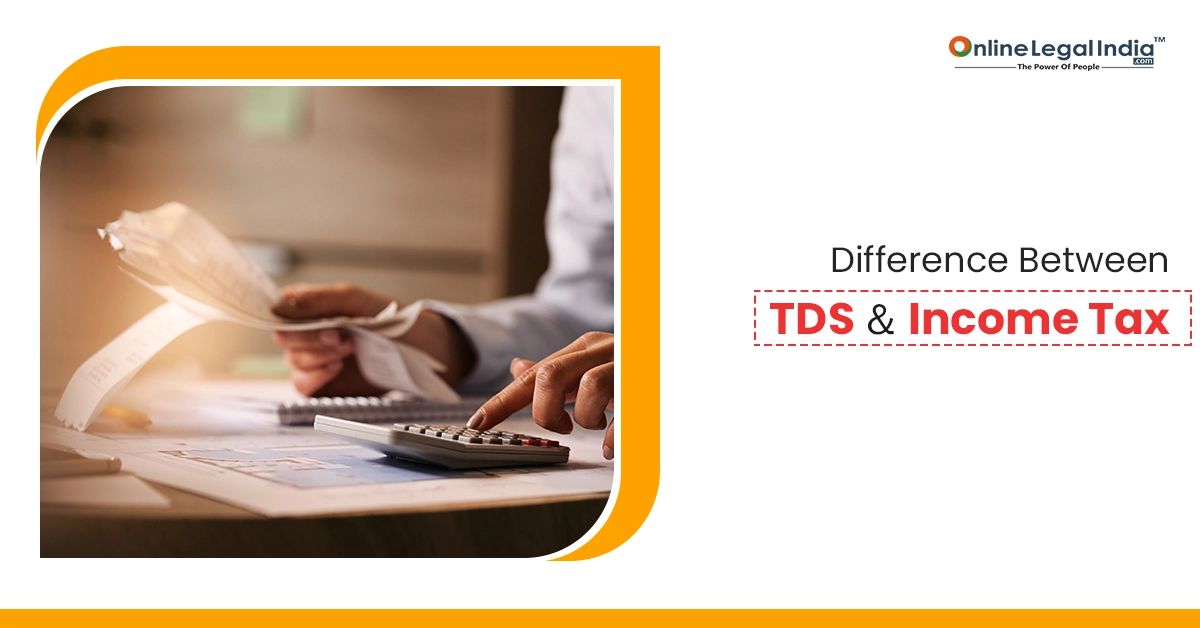Know the Cost to trademark a name and all the fees required
23 Apr, 2024

 By Online Legal India
Published On 08 Nov 2022
Updated On 06 Jan 2023
Category Income Tax
By Online Legal India
Published On 08 Nov 2022
Updated On 06 Jan 2023
Category Income Tax
Income tax is calculated using an individual's or company's annual income. Therefore, income tax is not calculated on a per-year basis. Taxation is, however, taken from the source over the fiscal year in which income tax is payable. The employer is responsible for deducting income tax from employee salaries.
As a tax, a proportion of lottery or gaming profits is taken from the total. Many other persons have income that is taxed at the source.
TDS stands for tax deducted at source. TDS assists in the collection of tax at the point of revenue creation. The government uses TDS to collect taxes and combat tax evasion. It taxes money at the source rather than after it has been calculated and deducted.
TDS is levied on a number of revenues, containing interest, commissions, dividends, and wages. TDS does not apply to all earnings or people in all situations. The Income-tax Act of 1961 set varied TDS rates for certain payments and beneficiaries. TDS does not apply to debt mutual fund redemption proceeds for residents, but it applies to non-resident Indians.
Income taxes are charged on the incomes of individuals and corporations. Income taxes can be levied on earnings from a variety of sources. Dividends and interest, gaming wins, goods sales, wages, & salaries are examples of these.
Individual income taxes are the broad term for income tax returns. Employees and other income-generating persons pay these taxes. In addition, companies, estates, trusts, and a variety of other entities pay income taxes on their earnings or revenue.
At the end of the year, a person may not have to pay income tax. However, this is a payable tax if an individual obtains money from wages and residential property.
There will be no tax deduction if his salary is less than the taxable limit. Also, if his/her income, which includes property income, exceeds the exemption limitations, he must pay tax on the yearly taxable income in one lump payment at the end of the year. Even if a person has no taxable income, TDS must be paid.
One example is revenue from dividends and interest on bank deposits. This income from dividends or interest is taxed at the point of receipt. Every year, he may not have any taxable income.
Assume you are looking for a loan to buy a house or another form of loan (education, car, etc.). Before issuing a loan, a lender would normally want proof of income. This will necessitate the submission of the income tax returns for the previous two or three years.
If you have losses under the titles "Capital Gains" or "Profits & Gains From Business or Profession" and want to carry these losses forward to the following fiscal year, you must file income tax.
You can file the income tax return for the current year whether or not your employee deducted tax at source. In such circumstances, the income tax authorities would determine your net tax due after deducting TDS. If you don't have to pay taxes, you can do an ITR filing online to get a refund. To trace your refund, check the status of the income tax return.
Every tax dollar you pay helps to grow your country. It contributes significantly to the government's cash flow. The government collected 9.45 lakh crores in direct taxes in FY19. The funds might be used for infrastructure building or other development initiatives by the government.
If you apply for a visa or credit card, you will be asked to provide documentation of your income. In most circumstances, you must present income tax returns from the previous three years. This will enable the other party to evaluate if you qualify for a visa and/or a credit card.
Any individual making certain payments under the Income Tax Act is obligated to deduct TDS when the payment is made. However, no TDS must be removed if the payer is a separate person or HUF whose records are not needed to be audited.
Individuals and HUFs are needed to deduct TDS at 5% on rent payments over rupees fifty per month, even if the person or HUF is not subject to a tax audit. Individuals & HUFs who are needed to deduct TDS at 5% do not need to apply for TAN. Your employer deducts TDS at the relevant income tax slab rates.
TDS rates for most payments are prescribed in the Income Tax Act, & TDS is reduced by the payer based on these rates. You don't have to pay any tax if you submit investment evidence (for seeking deductions) to the employer & the total taxable income is less than the taxable limit. As a result, no TDS should be taken from your earnings.
Similarly, if the total income is less than the taxable boundary, you can send Forms 15G and 15H to the bank so that they do not take TDS on the interest income.
Income tax is a tax imposed on an individual's total yearly income or a business entity's profit. TDS is a percentage of the projected tax that will be deducted on a regular basis or, in some cases, from an individual's wages. It might be either regular or erratic. While it may not be essential to pay tax at the source, it may be necessary to pay income tax at the end of the year.

Know the Cost to trademark a name and all the fees required
23 Apr, 2024

How to Register a Brand Name
17 Apr, 2024

How Can You Download FSSAI Certificate?
15 Apr, 2024

Copyright a Business Name Know the Procedure
13 Apr, 2024

Top 10 Law Firms in India
11 Apr, 2024

Consumer Complaint against Tamil Nadu Electricity Board TNEB
30 Nov, 2020

How to Take Legal Action against Mental Harassment in India?
07 Nov, 2020

UPPCL Uttar Pradesh Power Corporation Ltd. Complaint Filing
19 Nov, 2020

How to File a Complaint Online in Consumer Court in India
27 Nov, 2020

Online Complaint Filing against Hero Motocorp
04 Dec, 2020